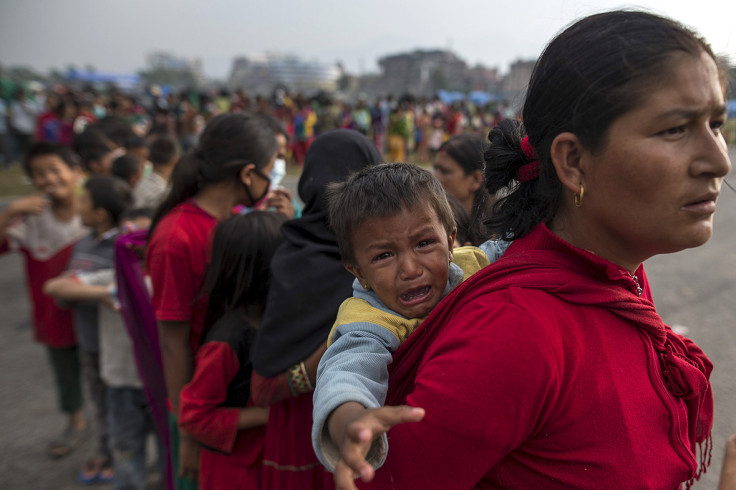Nepal earthquake: Women and children at risk of being trafficked

Thousands of vulnerable women and children affected by the Nepal earthquake that killed more than 8,040 people on 25 April are at risk of being forced into sex slavery, aid workers have warned.
The UN estimated that at least one million of people have been affected by the 7.8 magnitude quake and aid workers warned they are struggling to reach remote areas where people are more at risk of being recruited by traffickers.
"Our teams on the ground in Bhaktapur, Gorkha and the surrounding areas of Kathmandu have seen people going there in the name of relief and promising jobs to children and adolescent girls," Bhuwan Ribhu from Indian child protection charity Bachpan Bachao Andolan told Sky News. "And we fear they will be trafficked for sexual exploitation and for forced labour."
Another 7.4 quake struck the country on 12 May. Reuters reported that the quake's epicentre was close to Everest Base Camp, which was evacuated after an avalanche triggered by the quake on 25 April killed 18 climbers. The Guardian reported that many children are feared injured in a school in the Solukhumbu region.
Human trafficking in Nepal
Human trafficking is rampant in Nepal, where thousands of people are trafficked and forced into sex slavery and labour in appalling conditions. According to Anti-Slavery International (ASI), an NGO that works to eliminate all forms of slavery around the world, there is an increased risk of traffickers preying on vulnerable people following a natural disaster.
"We don't have any evidence of that happening already, but there is certainly an increased risk," ASI's press and digital media officer Jakub Sobik told IBTimes UK.
People in Nepal are both trafficked to other countries, such as India, and within Nepal, for example to big cities like Kathmandu. Nepalese people are trafficked for different reasons, it is not just sex trafficking
"When a major disaster strikes as it did in Nepal there is chaos and traffickers might use the opportunity to recruit people. We have seen that this already happened in other countries such as Haiti, following the earthquake [2010]. Children were for example trafficked to other countries through fake adoptions.
"Obviously children are most at risk because they are most vulnerable to being deceived," Sobik continued.
"People in Nepal are both trafficked to other countries, such as India and within Nepal, for example, to big cities like Kathmandu. Nepalese people are trafficked for different reasons, it is not just sex trafficking. For example they are also trafficked to work as domestic workers.
"Nepal is a country of migration. People, mostly adults, move abroad as they lack opportunities due to poverty, and sometimes desperation makes them take up sometimes risky job offers from informal recruiters, especially that the Nepal's government hasn't done much to facilitate safe migration."
According to a report by ASI, Nepalese migrant domestic workers are subjected to abuse abroad. "The plight of Nepalese migrant domestic workers is rooted in a continuum of vulnerabilities starting from their recruitment in their rural villages and lasting until they start work in a home in the Middle East and beyond," the NGO said.
"In 2012, Nepalese government introduced a ban on women under the age of 30 travelling abroad for domestic work. In response, many migrant workers seek unofficial routes of migration and therefore affect the ability of domestic workers to receive support, protection and representation of their interests."
© Copyright IBTimes 2025. All rights reserved.






















